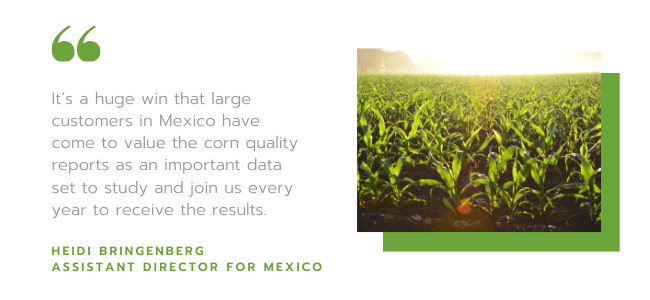The U.S. Grains Council (USGC) is helping major customers in Mexico adapt to shifts in corn quality and determine how to deliver that technical information during the COVID-19 pandemic through a series of webinars focused on grain processing and handling.
“The U.S. grains transportation system is one of the most efficient in the world and able to meet contract specifications each and every year,” said Heidi Bringenberg, USGC assistant director in Mexico. “Each year, the Council works to encourage farmers to take proactive steps that will pay huge dividends when their grain reaches international destinations. At the same time, USGC staff provides the quality information vital to buyers and end-users as they make decisions about processing needs.”
In May 2020, the Council presented information from its corn export quality report to feed miller and livestock producer associations in central and southeast Mexico, including AMEPA, ANFACA and InterIndustrias. AMEPA members, for example, represent around 7.5 million metric tons (295 million bushels) of grain consumption annually.
During this virtual rollout, USGC’s staff members in Mexico noted concerns among these key customers with elevated numbers for broken corn, foreign material (BCFM) in comparison to previous years. As a result, they put together follow-up meetings to provide information on how to sample, store, handle and manage grain and finished grain products keeping in mind elements of BCFM and mycotoxins.
“It’s a huge win that large customers in Mexico have come to value the corn quality reports as an important data set to study and join us every year to receive the results,” Bringenberg said. “Even though we have a challenging year in terms of quality, we are working together with these companies as a team to address the situation with mitigation measures so they can continue to rely on U.S. coarse grains and co-products.”
In July 2020, the Council organized a series of seminars featuring Dr. Carlos Campabadal with the IGP Institute at Kansas State University, who has expertise in grain management and could conduct the program in Spanish.
The conference presented relevant information on how to preserve the quality of grains and ingredients from origin to destination and before-and-after processing. The webinar also covered what measures are required during storage; best practices for sampling, cleaning, handling and preserving grains in tropical environments; storage infrastructure; and testing methodologies.
“Discussing BCFM corn was of great importance to attendees,” Bringenberg said. “Our customers were impressed with the unbiased information we presented and our offer to help them address any constraints or increase efficiencies.”
More participants signed up for the seminar than the webinar’s 100-person capacity, two-thirds of whom represented plants from a single company with 2.1 million tons (82.7 million bushels) of grain consumption annually. As a result, the Council arranged a second conference with identical material for those who were unable to attend.
The Council is also working with the companies with representatives at each of these conferences to track changes after hearing these practices. Because these highly technical programs are virtual, more staff who can implement these practices can participate, increasing the overall value of the outreach.
“During the pandemic, we are cognizant that agriculture is essential, and our customers are busy keeping feed mills operational and livestock fed,” Bringenberg said. “We want to offer programs of value and, so far, have been successful.”
About The U.S. Grains Council
The U.S. Grains Council develops export markets for U.S. barley, corn, sorghum and related products including distiller’s dried grains with solubles (DDGS) and ethanol. With full-time presence in 28 locations, the Council operates programs in more than 50 countries and the European Union. The Council believes exports are vital to global economic development and to U.S. agriculture’s profitability. Detailed information about the Council and its programs is online at www.grains.org.

